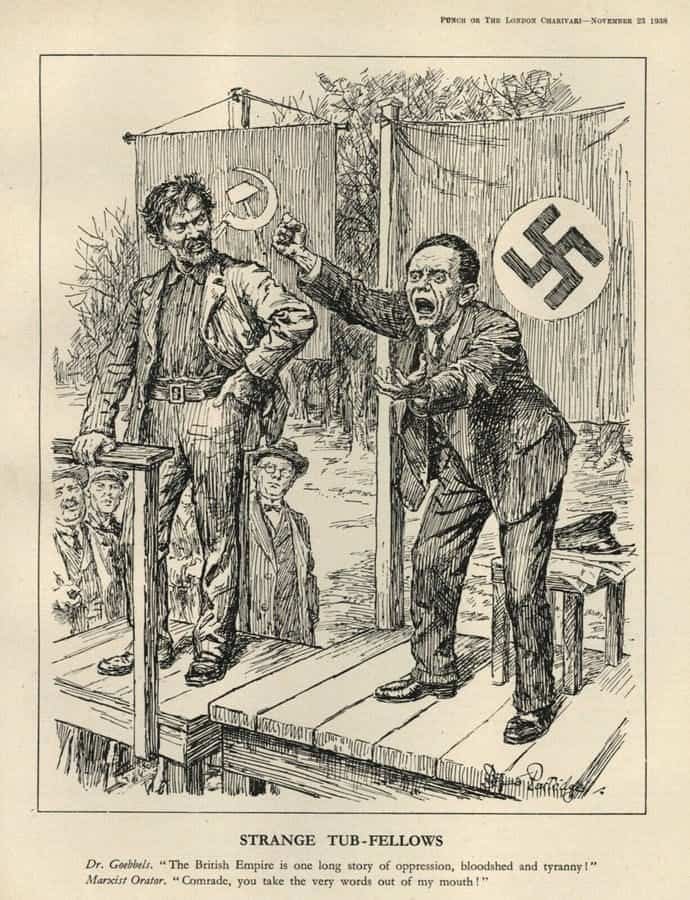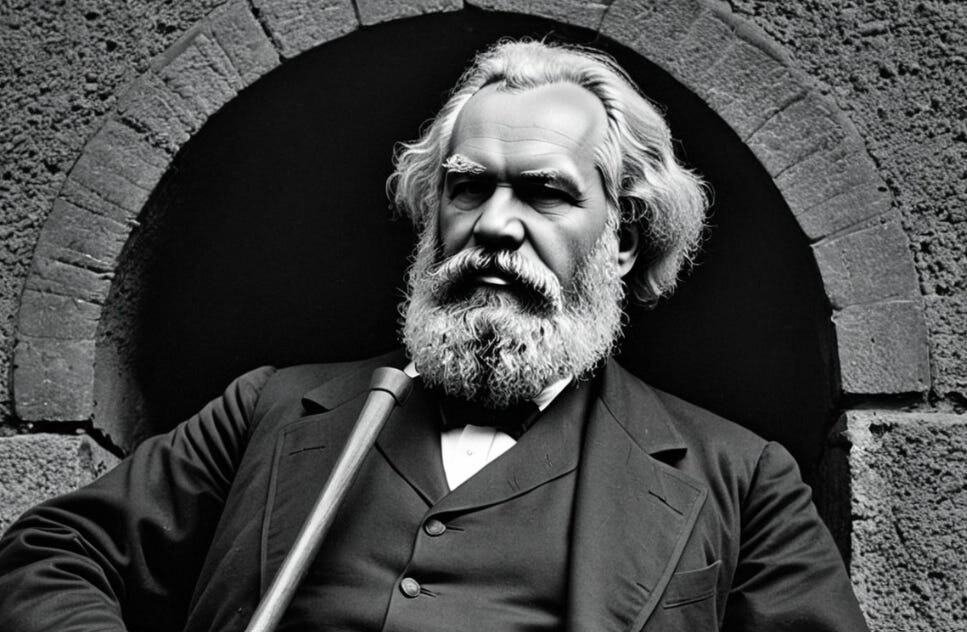Karl Marx, the godfather of Communism, is often accused by some people on the right of being the head of a Jewish communism conspiracy. But is that really the case?
I used to believe that thesis too, at one point. I even wrote long essays espousing this viewpoint using the familiar weak sourcing (Robert Wilton, Protocols, etc.). The shaky basis of the theory rests mostly on the fact that Marx was ethnically Jewish and descended from rabbis. But does this prove a Jewish conspiracy?
When you look at writings of Marx, all of his public and private declarations about Jews are extremely negative and hostile. He never wrote a good word about them and, in fact, labeled them the epitome of what he despised: capitalist profiteers (money-lenders, merchants, etc.).
Karl Marx was raised Protestant and professed belief in Christ as a youth.
Marx wrote “On the Jewish Question” and said this:
Let us consider the actual, worldly Jew – not the Sabbath Jew, as Bauer does, but the everyday Jew. Let us not look for the secret of the Jew in his religion, but let us look for the secret of his religion in the real Jew. What is the secular basis of Judaism? Practical need, self-interest. What is the worldly religion of the Jew? Huckstering. What is his worldly God? Money. Very well then! Emancipation from huckstering and money, consequently from practical, real Judaism, would be the self-emancipation of our time. An organization of society which would abolish the preconditions for huckstering, and therefore the possibility of huckstering, would make the Jew impossible. His religious consciousness would be dissipated like a thin haze in the real, vital air of society. On the other hand, if the Jew recognizes that this practical nature of his is futile and works to abolish it, he extricates himself from his previous development and works for human emancipation as such and turns against the supreme practical expression of human self-estrangement. We recognize in Judaism, therefore, a general anti-social element of the present time, an element which through historical development – to which in this harmful respect the Jews have zealously contributed – has been brought to its present high level, at which it must necessarily begin to disintegrate. In the final analysis, the emancipation of the Jews is the emancipation of mankind from Judaism.
And this:
Once society has succeeded in abolishing the empirical essence of Judaism – huckstering and its preconditions – the Jew will have become impossible, because his consciousness no longer has an object, because the subjective basis of Judaism, practical need, has been humanized, and because the conflict between man’s individual-sensuous existence and his species-existence has been abolished. The social emancipation of the Jew is the emancipation of society from Judaism.
So Marx labeled Jews hucksters and called for the abolition of Judaism and Jews as a unique group. Looking at that, it’s very hard for me to believe he was pursuing a tribalist agenda when he despised them. Don’t attach the name Marx to these statements and your average Neo-Nazi would be shouting in agreement.
Fredrich Engels, Marx’s closest collaborator and co-author of many communist texts, was a non-Jew. Ironically, Engels was notably less anti-Jewish in comparison with Marx and denounced the phenomenon publicly, although he made some private anti-Jewish remarks. How do the J-communism theorists explain that? The non-Jew Engels opposed anti-Semitism publicly, while the Jew Marx supported and contributed to it.
In 1845 in The Holy Family Marx claimed that in his articles in the Deutsch-Französische Jahrbücher he had “proved that the task of abolishing the essence of Jewry is in truth the task of abolishing Jewry in civil society, abolishing the inhumanity of today’s practice of life, the summit of which is the money system”. In 1849 an article in the Neue Rheinische Zeitung, of which Marx was the editor, criticised the notion that Jews living in Prussia’s Polish provinces should be regarded as Germans. The article declared that these Jews were “the filthiest of all races”. “Neither by speech nor by descent- but only by their greed for profit – can they be looked upon as relatives of the Germans in Frankfurt.” Robert Payne has remarked that “this solution of the Jewish question was not very different from Adolf Hitler’s, for it involved the liquidation of Judaism”.
Marx was poor and often had to take out loans (sometimes from Jews), which motivated much of his sentiment against them:
He had many dealings with Jewish financial agents in the City of London. The Bambergers (father and son), Stiefel and Spielmann were German Jews whose names frequently crop up in the Marx-Engels correspondence. Marx made use of the Jews to raise small loans and to discount bills of exchange received from Dana (editor of the New York Daily Tribune) in advance payment for articles which Marx had agreed to write. Marx complained bitterly that the Jews would not discount his bills until confirmation from Dana had been received’ and he was furious when they pressed him to honour debts due for repayment. Marx showed his contempt by always referring to them as “Jew (or little Jew) Bamberger” and “Jew Spielmann” or by imitating the nasal twang characteristic of the way in which some Jews from eastern Europe spoke German. Yet Marx had cause to regret the day when the Bambergers were not in business in London any more and were no longer available to discount his bills of exchange. In 1859 he wrote to Engels: ‘it is the devil of a nuisance that I have no Bamberger in London any more.’
He goes on to disparage his fellow J socialist Lasalle as a “Jewish n-word” among other insults. In fact, both privately and publicly he would go on and on about Jewish money-lenders (see above snippets) and that was his principle gripe with Jews as a group. All of this sounds strikingly similar to the Nazis’ own rhetoric about Jews and money-lending.


In my view this fully refutes the J-communism conspiracy. If the only thing Marx is writing about Jews both in public and privately is negative and he is advocating for their disappearance as a group/religion, then how could he be the centerpiece of an agenda to advance that group’s interests? Some people are emotionally attached to that theory though, so they will react with hostility to any facts that undermine it.
The only and main critique that the Nazis leveled at Marx and Marxism was its “denial of the personality principle” or the “race principle” and simply that Marx was “a Jew”, deceptively ignoring the similarity of his own views on Jews with theirs. Rarely, if ever, did they critique Marxism on economic grounds and, in the case of Goebbels, asserted that Marx was right in his critique of capitalism:
“Karl Marx described the causes of capitalist development reasonably correctly. But we [Marxists and National Socialists] are both always and forever right about capitalism. The will to freedom rises up from the collapsing system. It finds its form in fundamentally new ideas: in Bolshevism and National Socialism. Both emerge with the ultimate belief that they will bring freedom to an entire world by overthrowing it. Bolshevism and National Socialism are embodied in two people who lead a purposeful minority in the will to the future: Lenin and Hitler.” – Goebbels
“Lenin was the greatest man, second to Hitler. The difference between Communism and the Hitler faith is slight” – Goebbels

If you enjoyed this content consider a contribution or a membership.










